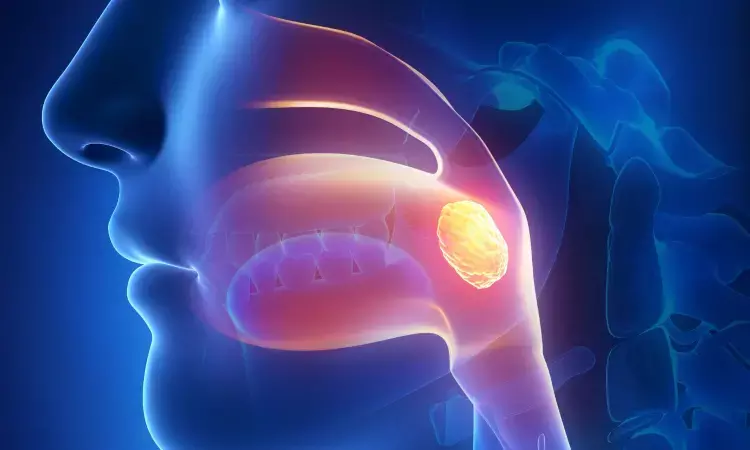- Home
- Medical news & Guidelines
- Anesthesiology
- Cardiology and CTVS
- Critical Care
- Dentistry
- Dermatology
- Diabetes and Endocrinology
- ENT
- Gastroenterology
- Medicine
- Nephrology
- Neurology
- Obstretics-Gynaecology
- Oncology
- Ophthalmology
- Orthopaedics
- Pediatrics-Neonatology
- Psychiatry
- Pulmonology
- Radiology
- Surgery
- Urology
- Laboratory Medicine
- Diet
- Nursing
- Paramedical
- Physiotherapy
- Health news
- Fact Check
- Bone Health Fact Check
- Brain Health Fact Check
- Cancer Related Fact Check
- Child Care Fact Check
- Dental and oral health fact check
- Diabetes and metabolic health fact check
- Diet and Nutrition Fact Check
- Eye and ENT Care Fact Check
- Fitness fact check
- Gut health fact check
- Heart health fact check
- Kidney health fact check
- Medical education fact check
- Men's health fact check
- Respiratory fact check
- Skin and hair care fact check
- Vaccine and Immunization fact check
- Women's health fact check
- AYUSH
- State News
- Andaman and Nicobar Islands
- Andhra Pradesh
- Arunachal Pradesh
- Assam
- Bihar
- Chandigarh
- Chattisgarh
- Dadra and Nagar Haveli
- Daman and Diu
- Delhi
- Goa
- Gujarat
- Haryana
- Himachal Pradesh
- Jammu & Kashmir
- Jharkhand
- Karnataka
- Kerala
- Ladakh
- Lakshadweep
- Madhya Pradesh
- Maharashtra
- Manipur
- Meghalaya
- Mizoram
- Nagaland
- Odisha
- Puducherry
- Punjab
- Rajasthan
- Sikkim
- Tamil Nadu
- Telangana
- Tripura
- Uttar Pradesh
- Uttrakhand
- West Bengal
- Medical Education
- Industry
Modified Monopolar Tonsillectomy bests coblation technique in tonsillectomy

A research article entitled ''A comparison of coblation and modified monopolar tonsillectomy in adults'' by lead researcher Zhengcai Lou published in BMC Surgery has explained a detailed comparison of modified monopolar tonsillectomy and coblation technique. They said that though the modified monopolar technique might cause more pain on days 1 and 2 after surgery, it offers significant advantages like reducing operation time, secondary PTH and costs.
The tonsillectomy is one of the most widely conducted otolaryngologic surgeries. There is no universally accepted consensus regarding the use of surgical instruments.
In this study, researchers compared the intraoperative records and postoperative clinical outcomes of adults who underwent coblation and modified monopolar tonsillectomy tonsillectomies.
The researchers divided adult patients with tonsillectomy into the coblation and modified monopolar tonsillectomy groups and compared estimated blood loss, postoperative pain score, operation time, post-tonsillectomy hemorrhage (PTH), and cost of disposable equipment.
The crucial insights from the study include the following:
- There were 653 patients in the age range of 18–46 years.
- Both groups had similar pain intensity on postoperative days 3 and 7.
- There was a higher mean maximum pain score in the monopolar group than the coblation group on postoperative days 1 and 2.
- In the coblation and monopolar group, Secondary PTH occurred in 7.1% and 2.8% (9/327) of patients.
- In the coblation and monopolar group, there was Uvula-significant oedema in 39.3% and 85.4%.
- The monopolar group had a shorter mean operation time.
- The cost of the disposable equipment 18 in the coblation and monopolar groups was US$ 430.48 and US$ 28. Respectively.
They said pain significantly increased on postoperative days 1 and 2 in the modified monopolar tonsillectomy group, and the operation time, secondary PTH, and medical costs were significantly decreased compared to the coblation technique group.
Further reading:
Lou, Z. A comparison of coblation and modified monopolar tonsillectomy in adults. BMC Surg 23, 141 (2023). https://doi.org/10.1186/s12893-023-02035-1
BDS, MDS in Periodontics and Implantology
Dr. Aditi Yadav is a BDS, MDS in Periodontics and Implantology. She has a clinical experience of 5 years as a laser dental surgeon. She also has a Diploma in clinical research and pharmacovigilance and is a Certified data scientist. She is currently working as a content developer in e-health services. Dr. Yadav has a keen interest in Medical Journalism and is actively involved in Medical Research writing.
Dr Kamal Kant Kohli-MBBS, DTCD- a chest specialist with more than 30 years of practice and a flair for writing clinical articles, Dr Kamal Kant Kohli joined Medical Dialogues as a Chief Editor of Medical News. Besides writing articles, as an editor, he proofreads and verifies all the medical content published on Medical Dialogues including those coming from journals, studies,medical conferences,guidelines etc. Email: drkohli@medicaldialogues.in. Contact no. 011-43720751


